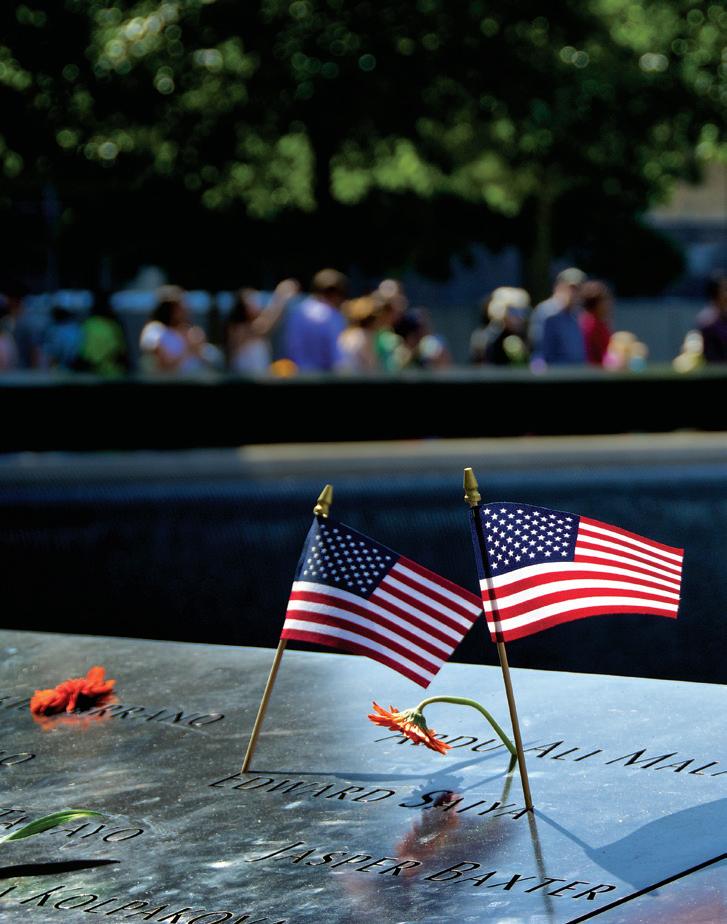
5 minute read
Lessons of 9/11
COMMUNITY // BY LEE FISHER
The perseverance we learned about 20 years ago still holds true today.
Twenty years ago, on Sept. 11, our world changed in an instant. It was one of the saddest, darkest, most horrific days in history. From the ongoing pandemic to natural disasters throughout our country and the world to terrorism at home and abroad to senseless gun violence in our neighborhoods, we are reminded every day that we live in an uncertain world. In the midst of this uncertainty, we also witness acts of strength, resilience and courage.
During the recent evacuation of U.S. and Afghan citizens who risked their lives by supporting the U.S. mission in Afghanistan, I witnessed such courage. On Sunday morning, Aug. 15, 2021, the American withdrawal from Afghanistan became very personal for me and my family.
I received a panicked call from Maya, a young woman who became a member of our family six years ago when my brother and sister-in-law helped her escape from a life of violence in Afghanistan. Since she was admitted to the U.S. as a refugee, we have watched with awe as she has worked her way to college, where she is now a junior.
Maya told me that her mother, father, two sisters and aunt were in grave danger because of their work to support the U.S. mission in Afghanistan. They stood in immediate danger of being killed by the Taliban if they were not evacuated before the Aug. 31 U.S. troop withdrawal deadline set by the Biden administration. The only way out of the country was to get through the gates of the Hamid Karzai International Airport in Kabul. After 20 years of an American presence throughout the country, the airport was now the only piece of Afghanistan still under the control of the U.S.
I reached out to as many people as possible for help. Two people, in particular, Clevelander Don Graves, deputy U.S. commerce secretary and former KeyBank executive, and Liz Shrayer, president & CEO of the U.S. Global Leadership Coalition, went into action. Shrayer contacted the U.S. Agency for International Development and arranged to have Maya’s family placed on the State Department’s refugee list. Graves arranged for the State Department to email an airport visa to Maya’s mother. That documentation was a huge step forward. When they received the airport visa, the family felt safe enough to travel to the airport.
When they arrived at the airport gate, there was chaos. Without food or water, thousands of Afghans were fainting from dehydration, hunger and exhaustion. Maya’s mother and two daughters were beaten by the Taliban, who were attacking the crowds, trying to discourage them from leaving the county.
Finally, on Friday evening, Maya’s mother and 15-year-old sister were able to get inside the gate, but the rest of the family could not. My sister-in-law got in touch with a U.S. marine who had a friend in the U.S. military at the Abbey gate. She shared photos of the family and information about what they were wearing. On Saturday, British troops helped the rest of the family get inside the gate. All five family members were given wristbands, and their documents were confirmed as valid.
But the good news was premature. Early Sunday morning, there was a shocking turn of events. Some U.S.


forces escorted the family out of the airport and back into harm’s way on the basis that they did not have proper documentation. This would have been cruel even if they did not have documentation, but it was incomprehensible given that they did. At this point, there were credible bomb threats, and Maya’s family, in a state of utter despair, was struggling deciding whether they should stay or give up and return home. What happened next is still not clear. But later that day, I received a call from a foreign journalist who had taken an interest in the plight of Maya’s family. He told me that some journalists who had befriended Maya’s family at the airport decided to take matters into their own hands. They explained to U.S. authorities that the family had proper documentation and should never have been ordered out of the airport. On Monday, Aug. 23, thanks to their intervention, the family was let back into the airport.
Three days later, two suicide bombers and a gunman attacked crowds of Afghans at the exact same place outside of the airport gate where Maya’s family had waited for days. Thirteen U.S. troops and at least 90 Afghans were killed.
Later that week, Maya’s family boarded a flight to Qatar, and then to Germany. Eventually, they will make their way to the U.S. to live in safety.
For me, the lesson of Sept. 11 and the story of Maya’s family is to put our challenges, frustrations and setbacks in perspective. Think about those who would long for the chance to be free and alive and have such problems. Live in the moment, value our freedom and be thankful we live in the greatest democracy in the world.
process 4-color red: C=0 M=100 Y=96 K= 33 green: C=43 M=0 Y=34 K= 38 blue: C=57 M=0 Y=6 K= 19

Lee Fisher is dean and Joseph C. Hostetler-BakerHostetler chair in law at Cleveland-Marshall College of Law at Cleveland State University. He is the former Ohio attorney general, lt. governor, director of the Ohio Department of Development, chair of the Ohio Third Frontier Commission, president and CEO of the Center for Families and Children, president and CEO of CEOs for Cities, state representative and state senator.
SAVE 25% OFF
Admission Prices Using CirclePass Explore three of University Circle’s top attractions. Purchase a CirclePass and reserve your timed tickets today! CirclePass offers admission to:
• Cleveland Botanical Garden • Cleveland History Center • Cleveland Museum of Natural History










